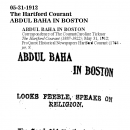Main menu
- ‘Abdu’l-Bahá’s Journey
- World Peace
- Stopping Racism in America
- Empowerment of Women
- More Principles...
- Prayer for America
‘Abdu’l-Bahá in Boston
Correspondence of The Courant Caroline Tickner
The Hartford Courant (1887-1922); May 31, 1912;
ProQuest Historical Newspapers Hartford Courant (1764 - pg. 8)
‘ABDU’L-BAHA IN BOSTON
LOOKS FEEBLE, SPEAKS ON RELIGION.
The Good Old Truths in Oriental Garb
SPEECH AT TWENTIETH CENTURY CLUB.
(Correspondence of The Courant.)
Boston, May 29
The intellectual novelty, is ever as much in demand as that which relates to headgear or wearing apparel, and Boston is never lacking in this requirement dear to the heart of Modern Athens.
At present ‘Abdu’l-Bahá Abbas, of Persia, apostle of unity and peace, is the recipient of much attention from those that delight in the pastime of “hearing things,” especially when voiced by visitors from some far country. If the distinguished visitor cannot speak our own tongue, but must put forth his edifying statements by means of an interpreter, so much the better, an added charm surrounds his utterances.
This is the case with the exponent of “Bahá’ísm,” who has been speaking at various gatherings in this city, through his interpreter, Dr. Ameen H. Fareed, who last Saturday voiced the wisdom of his superior at the Twentieth Century Club before an audience of representative Bostonians. Prior to this meeting ‘Abdu’l-Bahá Abbas attended a birthday party held in honor of his 68th birthday, in Cambridge under the auspices of the “Boston Bahá’í Assembly.” Here a large birthday cake figured in most appropriate fashion on which there were 68 candles in token of the prophet’s age, and three flags testifying to his association with Persia, America and also England; the latter flag was placed upon the cake in compliment to Miss Alice W. Buckton of London, who is an ardent advocate of “Bahá’ísm” and has done much to bring it before our public, though she has been known principally as the author of the successful Christmas morality play, “Eager Heart.”
It was the wish of ‘Abdu’l-Bahá to have a flag of every nation upon his cake, as he looks on himself as a universal citizen and claims all countries for his own. Owing, however, to the limited space upon the cake, his wish could not be gratified, and he was forced to be content with the most meager offering of the sixty-eight candles and three flags. Having favored the Cambridge coterie with an address, the prophet moved on to the Twentieth Century Club, where his interpreter set forth the teachings of his cult.
To those who are inclined to be deterred from friendly feeling towards this society of Persia and the exponents because of the name “Bahá’ísm,” it is well to explain that when translated into plain Boston vernacular it means “live like a Christian and join the Peace Society,” which after all cannot be termed a genuine novelty. According to the spokesman, “Bahá’ísm” means love, charity, kindness to all — in short, the fatherhood of God and brotherhood of man, and its fundamental principle is that “while religions are many, religion is one.”
The “novelty” of this assertion may seem to the general public quite akin to the “novelty” which is frequently set forth by every Christian church, yet cannot do any harm when offered in a vague picturesque manner by an impressive interpreter.
The Bahá, who seemed quite feeble and looked more than his age, spoke of the new religion which must supplant the worn-out dogmas; “fettered by these,” he said, “enmities will increase day by day until they have caused the destruction of the entire human race. We must band ourselves together to increase friendship among men. God makes man to establish just equality, not to transgress laws; to help each other and to live together in love.” We must wipe out the horrors of war and hatred and work for unity and peace.
The Bahá exhorted all to be eager to suffer for such an end, and exclaimed: “Bahá’u’lláh, my father, spent sixty years in prison. In prison he unfurled the banner of universal peace, writing to kings and rulers of the earth. So his face became radiant and among all the countries of the earth the bond of “Bahá’í” was established. Be dissolved in love, so that you may lose consciousness of everything except the good of all.” The address at the Twentieth Century Club was followed in the evening by another delivered at Huntington Chambers. At the conclusion a weird chant was sung, during which some of the audience knelt in prayer and the Bahá left the hall, giving his benediction right and left, and receiving greetings from the faithful. Undoubtedly there is a special charm attached to that which comes to us with a true Oriental flavor and there are in every community (though perhaps more in Boston than elsewhere) a class of sentimental beings who will fervently follow good advice if only it is offered them attired in a picturesque foreign costume. Those that inquire closely into the marvelous reforms inspired by Oriental teaching, or the spiritual uplift produced by some foreign revivalist will generally conclude that nothing new has been set forth to evoke such response. Only the good old truths to which the listeners had previously turned deaf ears, had suddenly come forward dressed in a floating tunic, or Roman toga, and had awakened the attention of apathetic ones by speaking to them in some foreign tongue.
Caroline Tickner.









